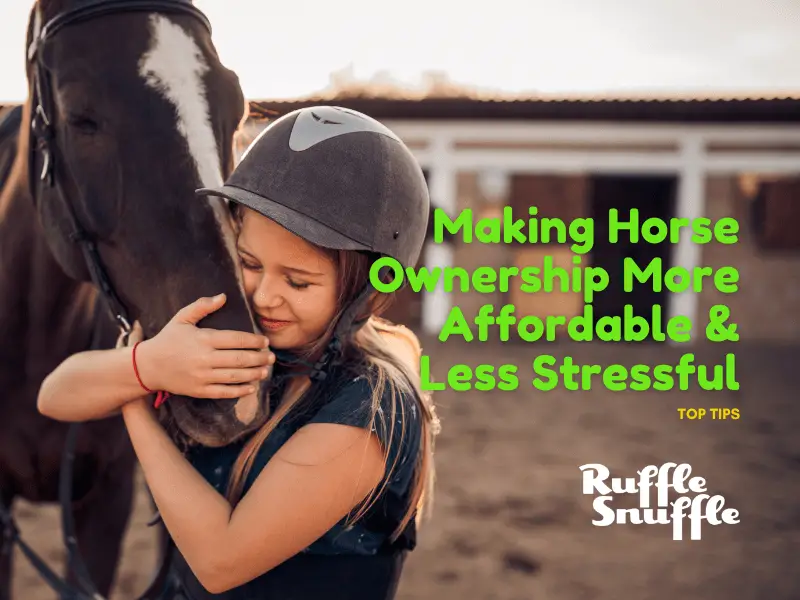As far as pet ownership is concerned, owning a horse is one of the most expensive solutions. While there is no escaping this fact, several steps can be taken to make it more affordable and less stressful.
The first step is to familiarise yourself with the strategies that can cut costs without harming your horse’s health or happiness. Focus on the following advice to gallop your way to success.
#1. Protect Against Unforeseen Expenses
Life has a nasty habit of serving up unwanted situations at the worst possible times. However, you can afford to let this stand in the way of giving your pet the care that they deserve. Likewise, issues directly or indirectly linked to horse ownership cannot be allowed to blow a hole in your finances.
First and foremost, then, you must put pet insurance in place. This will allow you to implement a quick response when health issues surface. Meanwhile, you should extend your financial precautions to assets used for your horse. Horsebox insurance is very important as the vehicles are expensive and could be damaged by vandals or other road users. If nothing else, the knowledge that you can fix this fast through insurance claims puts your mind at ease.
Persisting with a faulty horsebox because you don’t currently have the funds to cover the repair or replacement costs is never the answer. Of course, any other big assets like stables deserve protection too.
#2. Maintain Your Horse’s Health
Pet insurance can save you from a financial nightmare. Nevertheless, prevention is always the best form of protection. For your finances as well as your pet’s wellness. Nutrition should sit at the forefront of your thinking. A nutrient-rich diet combined with supplements to support your horse’s natural defence systems is ideal.
It’s also important to ensure that your horse gets enough exercise and is vaccinated against common equine diseases. Above all else, you must implement a quick response if your pet’s health starts to deteriorate. Horse wellness can influence their behaviour and the riding experience. So, staying vigilant to changes in these aspects could be key to identifying symptoms before serious health concerns grow. If you’re concerned, get things checked ASAP.
A specialised equine vet can quickly confirm any health issues or put your mind at ease. By treating any problems quickly, your horse has the best chance of a quick recovery. Moreover, it puts far less strain on your finances.
#3. Purchase The Right Products
Horse ownership isn’t just about investing in a horse and finding a suitable stable. You will need to purchase an array of products to give your pet the best quality of life. From a financial perspective, choosing the right products at the first attempt is crucial.
Firstly, there are a lot of unnecessary products out there, which is why you must conduct your research. Avoiding wasted purchases will save you a fortune in the long run. Similarly, you should always invest in quality products as inferior items often break within a few uses. It’s an old cliche but if you buy bad, you will buy twice. When choosing saddles or jackets, for example, finding the right fit for your pet is vital too. Guessing will bring regrettable decisions.
As well as buying the right items that are used directly by your horse, you must consider the tools used. Whether it’s hay forks and equestrian bedding tools or feeders doesn’t matter. Aside from direct financial savings, easier maintenance saves time and money.
#4. Work At The Stables
If equine pet ownership is becoming too expensive, why not make use of your time with horses by getting paid? Helping out for a few hours at the stables or providing horse transportation can help you earn funds to cover the ongoing costs.
While it is a good move for adults, it is an even better strategy for teaching kids about money and responsibilities. They will learn that pet ownership isn’t cheap and subsequently appreciate their blessings. Moreover, it helps them develop key skills that support equine care but also transfer into other aspects of life. Again the funds that they earn from this small part-time job can help reduce the financial strain of horse ownership.
If you or your children do not want to spend time at the stables, maybe horse ownership isn’t as important to you as once thought. So, when funds are tight, this can be the acid test to determine whether now is the time to consider selling your pet.
#5. Reduce Costs With Regular Maintenance
The benefits of a proactive approach to the horse’s health have already been discussed. However, you must also implement quick responses when dealing with maintenance. When you do, it’ll be possible to reduce waste like hay and feed.
For example, cleaning manure and urine from bedding daily allows you to reposition it and save untouched areas. This will extend the life of the bedding to save you a significant amount of money in the long run. Similarly, weighing out food can help you from overfeeding the horse, which is good for the pet’s health as well as your finances. It also reduces the frequency of visits to suppliers, which reduces travel costs. And gives you more time with your horse.
By now, you’ll probably realise that buying in bulk is often a good idea. However, it isn’t if items end up wasted due to expirations or poor storage. Splitting the bulk purchase with another horse owner provides a simple solution to this problem.
#6. Focus On Storage
The importance of storage has already been touched upon. But it’s not only hay, bedding, and food that matters. You also need to keep all equipment safely stored. Otherwise, even quality products will need replacing prematurely.
Stables and sheds are prone to a host of issues that cause rust and similar problems. Moreover, inferior storage solutions put you at risk of misplacing items. Staying on top of the organisation with racking, shelving, and storage boxes will serve you well. If you are concerned about theft, either from other horse owners or intruders, padlocks are your friend. Of course, you need to ensure good security to protect your pet.
It might not have the same level of impact as other steps for your finances. After all, an initial outlay is needed. As with many aspects of horse ownership, though, calculated decisions that focus on the long-term situation will keep you on track.

